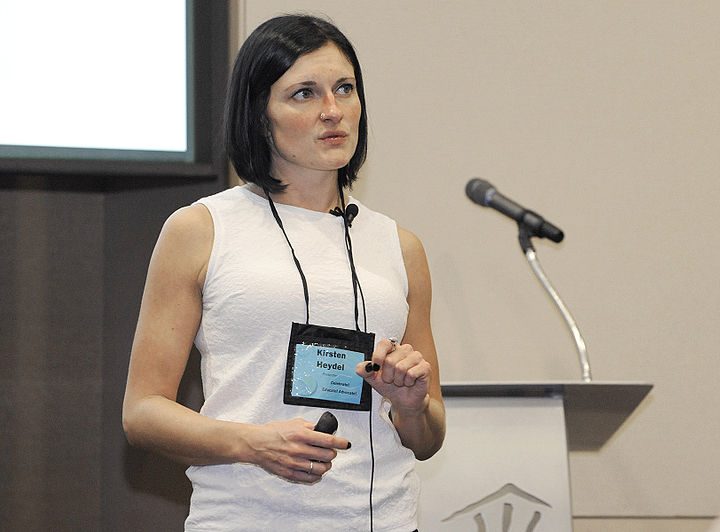Winner of the Fall 2018 StMU History Media Award for
Best Article in the Category of “Human Rights”
Have you ever wanted to make some easy money by selling your old stuff? Thanks to websites like Craigslist and Backpage, you can. Both Craigslist and Backpage are two of the largest classified advertisement websites. They allow you to search for and sell items in and around your local area. They even give you the option to post advertisements for job listings, events and activities. Craigslist was founded in 1995, and Backpage was founded in 2004.1 Craigslist is owned by its founder Craig Alexander Newmark, and Backpage was formerly owned by Village Voice Media and was run by its former CEO Carl Ferrer. Backpage is now owned by a Dutch company called Atlantische Bedrijven CV.2 These websites may seem like a harmless way to look for products and services, but the truth is these websites had a personal ad section that made it easy for young girls and women to be sexually exploited.

The personal ad section on these websites allowed for people to meet men and women in their area. Typically, these ads were used to find someone to date or with whom to have casual sex. Although these personal ad sections were intended for people to connect and interact with other persons, they were misused. These ads turned into the perfect platform for pimps and traffickers to promote the sale of women and children for sex. As shocking as it sounds, research has shown that the internet is a common tool for sex traffickers to use. Using the internet allows traffickers to reach a larger number of potential clients while eluding law enforcement.3 For them, the internet is the safest way to make money. The service providers Craigslist and Backpage, however, did nothing to stop people from using their websites in this way. Instead of preventing the ads from being posted or taking them down, they published them.
Several people filed lawsuits against Craigslist and Backpage because they wanted these websites to be held liable for publishing sex ads.4 After being faced with backlash, Craigslist and Backpage agreed to implement some requirements for their advertisements. In 2008, Craigslist required a fee for those persons posting in the “adult services” part of their personal ad section. The fee ranged between 5-10 U.S. dollars per ad. People would need to use a valid credit card and provide a verifiable phone number. This requirement, however, did not have much of an impact. Many traffickers simply used fake credit cards and phone numbers to pay the fee.5 Through these fees, Craigslist and Backpage made a huge profit. Craigslist made $44.6 million from their adult services advertisements and Backpage made $24 million.6 Their adult section, however, was the only one with a fee attached. To get around the fee, people would simply post their sex ads in other sections. Another attempt made by Craigslist and Backpage to reduce the chances of sex trafficking was removing posts with words such as “sexy” and “young.” This also proved to be ineffective. People would use code words so that their ads would not be removed. For example, pimps and traffickers used words like ‘new’ to indicate that the girl was a minor. Backpage even helped to edit advertisements by changing the words so that they would not get flagged or reported.7 The websites changes were not effective in reducing the number of sex ads posted. Craigslist and Backpage still failed to consistently block ads for illegal activity such as sex trafficking.

Many women and children were trafficked through these websites. In one case, three young women were repeatedly raped while they were minors when they were sold through Backpage’s website. Each of these victims filed a lawsuit against Backpage back in October 2014. This case is known as Doe v. Backpage.com. The lawsuit claimed that the classified ad company had engaged in sex trafficking of minors. They argued that the websites were engaged in trafficking since they did such a poor job in governing the content of the ads being posted. The U.S. Court of Appeals for the First District ruled in favor of Backpage and held that Backpage was protected under U.S. Code Title 7 Section 230, more commonly known as the Communications Decency Act (CDA). 8
] The purpose of the CDA is to regulate interactive computer services. The CDA makes it the policy of the United States “to preserve the vibrant and competitive free market that presently exists for the Internet and other interactive computer services” and “to ensure vigorous enforcement of Federal criminal laws to deter and punish trafficking in obscenity, stalking, and harassment by means of computer.”9
In their decision, the Court of Appeals argued that by claiming that Backpage facilitates sex trafficking through its posting rules, you are treating Backpage as the publisher of the content which the CDA prohibits. Section 230 subsection (c) states, “No provider or user of an interactive computer service shall be treated as the publisher or speaker of any information provided by another information content provider.”10 The Court believed that Backpage should not be held responsible for what its customers convey on its website. Just a year prior to this case, another lawsuit was brought against Backpage. This case was Backpage.com, LLC v. Cooper. In this case, just like in Doe v. Backpage.com, Backpage argued that they had no knowledge of the content posted on their website. The Court ruled that their classified ads were protected under the First Amendment of the Constitution. They argued that it is unlawful to censor an entire category of speech on a website. They also stated that it would place “an impossible burden” on Backpage to review the millions of ads posted on its website.11
Just like Backpage, Craigslist was faced with numerous lawsuits. Those who brought lawsuits against Craigslist wanted them to be liable and accountable for allowing such advertisements to be published on their website.12 Many advocates fought hard against these two companies. They wanted the sex advertisements on these websites to be criminalized, and to put an end to the use of online classified ads to exploit both adults and children.

The most recent legislation dealing with online sex trafficking was introduced by the Senate. Earlier this year, it was passed by Congress. This piece of legislation is an anti-sex-trafficking bill known as the Stop Enabling Sex Traffickers Act. This act is an exception to Section 230 of the CDA. This Act states, “section 230 was never intended to provide legal protection to websites that facilitate traffickers in advertising the sale of unlawful sex acts with sex trafficking victims; and that clarification of section 230 is warranted to ensure that that section does not provide such protection to such websites.“13 Essentially, this Act allows for sex trafficking victims to sue the websites through which they were trafficked. As a result from the passing of this bill, Craigslist shut down its personal ad section; however, this website remains active today. Backpage, on the other hand, was seized by the FBI and it remains seized to this day. Although action was taken against these websites, there are still several other active websites similar to Craigslist and Backpage. Those who relied on the two sites for sex trafficking have turned to other places on the internet. Shutting down sex advertisements in these cases have not stopped pimps from trafficking young girls and women online; it has just moved their operations to other providers. Despite efforts to target and censor websites like Craigslist and Backpage, trafficking displacement is an inevitable consequence.14 The FBI, however, is making an effort to monitor different forms of illegal activities online, especially sex trafficking. One way we can help fight online sex trafficking is by going after those websites that allow it to happen. If you go to the FBI website, you will find information on how to report instances of human trafficking. The FBI informs us to call the National Human Trafficking Resource Center (NHTRC) if we believe that we are a victim of a trafficking situation or if we have information on a potential trafficking situation. We can reach the NHTRC at 1-888-373-7888, where we can talk to specialists who answer calls at anytime from anywhere. 15 Do not be afraid to seek out help or to report what you believe may be a trafficking situation. Let’s help put an end to online sex trafficking!
- Shana M. Judge, “The Effect of Measures Taken by Craigslist to Screen Online Ads for Commercial Sex,” Social Science Computer Review 36, no. 3 (June 2018): 298. ↵
- Marie- Helen Maras, “Online Classified Advertisement Sites: Pimps and Facilitators of Prostitution and Sex Trafficking,” Journal of Internet Law 21, no. 5 (2017): 17. ↵
- Erin Heil and Andrea Nichols, “Hot Spot Trafficking: A Theoretical Discussion of the Potential Problems Associated with Targeted Policing and the Eradication of Sex Trafficking in the United States,” Contemporary Justice Review 17, no. 4 (2014): 422. ↵
- Shana M. Judge, “The Effect of Measures Taken by Craigslist to Screen Online Ads for Commercial Sex,” Social Science Computer Review 36, no. 3 (June 2018): 298. ↵
- Shana M. Judge, “The Effect of Measures Taken by Craigslist to Screen Online Ads for Commercial Sex,” Social Science Computer Review 36, no. 3 (June 2018): 299. ↵
- Erin Heil and Andrea Nichols, “Hot Spot Trafficking: A Theoretical Discussion of the Potential Problems Associated with Targeted Policing and the Eradication of Sex Trafficking in the United States,” Contemporary Justice Review 17, no. 4 (2014): 428. ↵
- Erin Heil and Andrea Nichols, “Hot Spot Trafficking: A Theoretical Discussion of the Potential Problems Associated with Targeted Policing and the Eradication of Sex Trafficking in the United States,” Contemporary Justice Review 17, no. 4 (2014): 429. ↵
- Kerianne Strachan, “Doe v. Backpage.com: The United States Court of Appeals Further Extends Immunity for Internet Service Providers Under the Communications Decency Act,” Tulane Journal of Technology & Intellectual Property 19, (2016): 262 and 47 U.S. Code § 230 – Protection for private blocking and screening of offensive material, and S.652 – Telecommunications Act of 1996 enacted by 104th Congress (1995-1996). ↵
- § 230. Protection for private blocking and screening of offensive material, 47 USCS § 230 ( Current through PL 115-253, approved 10/3/18 ). https://advance-lexis-com.blume.stmarytx.edu/api/document?collection=statutes-legislation&id=urn:contentItem:4YF7-GV61-NRF4-44C3-00000-00&context=1516831. ↵
- § 230. Protection for private blocking and screening of offensive material, 47 USCS § 230 ( Current through PL 115-253, approved 10/3/18 ). https://advance-lexis-com.blume.stmarytx.edu/api/document?collection=statutes-legislation&id=urn:contentItem:4YF7-GV61-NRF4-44C3-00000-00&context=1516831. ↵
- Marie-Helen Maras, “Online Classified Advertisement Sites: Pimps and Facilitators of Prostitution and Sex Trafficking,” Journal of Internet Law 21, no. 5 (2017): 18. ↵
- Shana M. Judge, “The Effect of Measures Taken by Craigslist to Screen Online Ads for Commercial Sex,” Social Science Computer Review 36, no. 3 (June 2018): 298. ↵
- S. 1693, 115th Cong. (2018) Stop Enabling Sex Traffickers Act (enacted). ↵
- Erin Heil and Andrea Nichols, “Hot Spot Trafficking: A Theoretical Discussion of the Potential Problems Associated with Targeted Policing and the Eradication of Sex Trafficking in the United States,” Contemporary Justice Review 17, no. 4 (2014): 432. ↵
- “Human Trafficking/Involuntary Servitude.” FBI. May 03, 2016. Accessed October 30, 2018. https://www.fbi.gov/investigate/civil-rights/human-trafficking. ↵



180 comments
Daniela Cardona
I have been afraid of Craigslist all my life, but have never heard of Backpage. I only knew to fear Craigslist, but I never knew why. It’s really scare to know that these sites are used for sex trafficking and even scarier to think they knew and did nothing about it. I cannot even fathom the thought process behind that. I love how researched this article was, it made everything more real and therefore more terrifying. I am so glad that more laws have come in to play to protect people from horrific crimes like this, and I hope things such as these can be abolished some day.
Lyzette Flores
Craigslist is a website that many people I know use it. They say it is very convenient and easy to use. I’ve been well aware of the website but had no idea that is was used for sex trafficking. I am glad there was an action done and craigslist shut down that personal ad section. Everyone needs to be well aware of their surroundings because you never know if sex trafficking can be occurring right in front of your eyes.
Christopher Vasquez
Sex trafficking is a major problem, and it needs to be stopped. It’s a shame that such a good business idea was used to promote evil. It’s unfortunate that the attempts of Craigslist to require credit cards and verifiable contact information weren’t successful, or that even their attempts to remove commonly searched words were circumvented by using new words. I’m glad that there are more people regulating sites like these.
Jose Sanchez
It is crazy to see how a website meant to make selling things easier can be used for such horrible acts. It is a shame that Craigslist and Backpage rather than do anything meaningful, allowed this to continue, completely unhindered, and at some points helped, simply to make money. Websites should be vigilant of these activities and take steps to stop them rather than profit off of them.
Marina Castro
Good article. Social media and the internet as a whole are a valuable tool in modern society. However, it is true that such platforms allow crime to occur. I know that many people utilize Craigslist to shop and do other things that are helpful to them. This article proves the dangers these platforms can bring and certainly brings awareness to it users.
Robert Freise
I have used Craigslist to shop for a vehicle and some other things. I am very surprised that the site was being used for sex trafficking. I would think that security checks on the site would help with this problem or people that deal with online security should do a better job to find out who is dealing with this terrible act of using people for their own benefit. This article is really interesting and it gave me the impressing that this is not a perfect world.
Engelbert Madrid
Online sex trafficking is a major issue. Illegal trafficking is leading to many young girls to be sexually abused by adults. Therefore, it must come to an end. It is sad to know that famous websites like Craiglist and Backpage are letting sex traffickers due to their business, but they forget that many women are being affected by this.
Mariah Cavanaugh
Your deep dive into the horror of human tracking was well presented in this article. Sex trafficking is something that only recently has hit the radar and technology adds yet another barrier to the horrific crime. In your article you mentioned the passing of the Stop Enabling Sex Traffickers Act (SESTA), which added an exception to section 230 of the CDA. While that bill may have been well intentioned it was opposed by adult sex workers who felt it would increase the likely hood that they would face violence. Sex workers use websites to vet customers, receive payments, and keep their work off of the dangerous street corners. The bill is also dangerously close to infringing on the first amendment rights of those who run websites, that could lead to a slippery slope.
Donte Joseph
I had always seen the use of Craigslist and Backpage but never actually used it. I was extremely surprised when I learned that both sites were used for sex trafficking. I was even more surprised by how both websites just let it slide and did not react to it. I think the only reason they did that is because of the money that the illegal action brought in, but I am glad that there are laws protecting more people.
Kathyleen Lauriano
This article was very intriguing to read. I never knew about Craigslist and the sex trafficking. I have read many stories on sex trafficking and how the businesses are. Its truly disgusting and scary. The fact that people can sell other humans for their own greed is sad. The people that buy are just as sick as those who sell. This article was well written and a good read. Nice work!